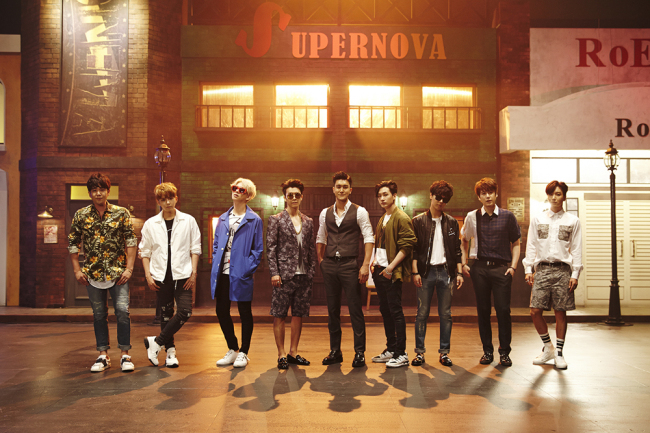This is the fifth article in a series that explores the driving forces behind hallyu and the global rise of Korean pop culture. --Ed.
Since the first wave of idol stars and groups created the musical and social sensation in the late 1990s that has become today’s K-pop culture, one entertainment company has always stayed a step ahead.
The home of H.O.T, BoA, TVXQ, Super Junior, Girls’ Generation and EXO and many more household names, S.M. Entertainment has yet to suffer a major failure -- despite legal battles and public entanglements over artistes’ contracts -- since founder and head producer Lee Soo-man established the company in 1995.
Perhaps that is because S.M. is run under the banner of “CT,” or “culture technology,” a term Lee coined to describe the agency’s strategy. At a media presentation at the SMTOWN Coex Artium in Seoul on Jan. 27, Lee told reporters that the concept was most relevant for S.M.’s “artiste development system.”
 |
S.M. Entertainment founder Lee Soo-man gives a presentation to reporters at the SMTOWN Coex Artium in Seoul on Jan. 27. (S.M. Entertainment) |
In essence, culture technology dictates that the development of artistes is undertaken in a technical and formulaic manner, just as new products are developed at information technology companies.
New and innovative groups are carefully planned and produced, rather than discovered.
In the philosophy of S.M., stars are made, not born.
That central idea will remain unchanged for the foreseeable future: Lee said at last month's presentation, “Today, right on this stage, I would like to converge and expand S.M.’s four core culture technologies that we have developed over the past 20 years ... and re-create them into a more advanced New Culture Technology, ‘NCT.’”
According to Lee, NCT combines S.M.’s existing method of creating and producing teams with the element of interaction. In fact, interaction is at the center of the five new projects being undertaken by S.M. Entertainment in 2016, from the collaboration-heavy digital music channel STATION to the mobile app Rookies Entertainment.
 |
Stills from the teaser video for upcoming S.M. boy band NCT (S.M. Entertainment) |
When taken into consideration along with S.M.’s history of heavy interest in ways to integrate their entertainment content with IT, the projects seem to signify a move to become a vertically integrated media company. In addition to creating and producing stars, S.M. is well on its way to creating its own mobile platforms for the distribution of its content.
On Feb. 11, S.M. Entertainment announced that Chinese online giant Alibaba bought a 4 percent stake for 35.5 billion won ($28.8 million). Although S.M.’s public relations team leader Jung Sang-hee told The Korea Herald that the move is “mostly symbolic” and does not signify any major changes yet, it is undeniable that fostering a friendly relationship with Alibaba is a step toward breaking into the huge Chinese market through Alibaba’s newly acquired video sharing channel Youku Tudou.
Scandals and lawsuits
It is not yet certain how this new open-door policy focused on interaction with fans will affect daily operations at S.M., notorious for its tight control over its artistes. Over the years, the company has been embroiled in scandals and lawsuits filled with accusations of excessive control and unfair profit sharing.
The most public case was concerning Kim Jae-joong, Park Yoo-chun and Kim Jun-su, three former members of boy band TVXQ, who filed a suit against S.M. in 2009 to suspend their contracts. After a very public battle, the two sides reached an agreement in 2011, freeing the three members to pursue a new career as the trio JYJ -- although they allegedly faced some pushback from S.M. in trying to block their appearances on TV.
 |
TVXQ (S.M. Entertainment) |
The uproar over top boy band TVXQ’s split even led to the passage of the “JYJ Act” in the National Assembly, barring TV networks from keeping musical artists off the air without legitimate reason.
Although other contract woes at the agency have not been as drawn out, they have been several more -- most notably with Chinese members of S.M.’s multinational groups.
Hankyung, a former member of Super Junior, also approached the courts to suspend his contract with S.M. in 2009, citing that the contract was for 13 years and required them to follow overly demanding performance schedules.
 |
Super Junior (S.M. Entertainment) |
Similar complaints came from Kris and Luhan, two Chinese members formerly signed with the group EXO, in 2014, and Tao, another EXO member, in 2015. Those cases are still ongoing.
Despite its troubles with a number of overseas artistes, performing abroad and integrating foreign artistes and fans are central to the S.M. strategy.
Pioneering overseas market
Lee Soo-man began formulating plans to take his artistes abroad in the 1990s, eventually landing boy band H.O.T a solo performance in Beijing in 2000 -- the first Korean musicians to do so. Two years later, starlet BoA made history as the first Korean artist to hit No. 1 on the Japanese Oricon charts. In 2011, a group of S.M. artistes known collectively as SMTOWN held a joint performance at Madison Square Garden in New York City.
These were the points in S.M.’s history that were chosen to highlight the company’s evolution and growth at the start of the New Culture Technology presentation. Today, S.M. artistes perform all over the world on tours and special promotions, often releasing Japanese-language or Chinese-language songs. All of these efforts represented the company’s march toward Lee’s vision of the ultimate end of hallyu: localization.
Since 2011, Lee has espoused a theory of three stages of hallyu, which he reiterated at the presentation.
 |
EXO (S.M. Entertainment) |
“We believe that the final stage is possible from 2016,” he said. “From the first stage where we only exported cultural products of hallyu, we advanced to the second stage, where we expanded the market through cooperating with local companies and artistes. Finally in 2016, S.M. will be able to achieve the third stage, as it establishes joint ventures with local companies, and hands down and transfers its culture technology to the local market.”
The achievement of this third stage will be symbolized by upcoming new boy band NCT, which stands for “Neo Culture Technology.” The group is more accurately described as a brand, with members performing the same songs simultaneously in cities all over the world, creating content localized in the style and language of each region. The group will have no limits to the addition of new members, changing the current paradigm of idol groups.
“Through such musical and cultural attempts, S.M. will achieve the true definition of hallyu localization,” Lee said at last month’s presentation. The Seoul and Tokyo units of NCT are set to debut in the first half of this year, with Chinese units coming in the latter half, followed by groups in Southeast Asia and Latin America -- traditional hallyu strongholds.
Although these groups are designed to provide localized experiences, public relations team leader Jung said that the groups are not meant to be seen on equal footing with other local musical artists, but to be understood as products of hallyu. “The important thing is that they were created through S.M.’s system,” she said, “meaning that they will appeal to fans who like existing S.M. artists.”
Flexing muscles
The idea of an S.M. artiste group with limitless members performing simultaneously all over the world and constantly creating content caused apprehension among some K-pop fans who watched Lee’s presentation as it streamed over YouTube.
“From what I can tell, S.M. seems to be driving hard and fast toward a monopoly on Korean entertainment,” said one commenter using the ID “K-Pop Biased.” Another user identified as “S LOR” wrote, “While watching this, why do I feel like this will cause an apocalypse in the K-pop world with one company having too much control?”
 |
f(x) (S.M. Entertainment) |
S.M. was the most prolific label of 2015, releasing a total of 22 records, and took home nine trophies at last year’s Mnet Asian Music Awards -- the most by any K-pop agency. Despite losing members -- three Chinese members from EXO, Jessica from Girls’ Generation and Sulli from f(x) -- those flagship groups still emerged as the honorees for top year-end music awards, including Best Album and Best Female Group.
The year 2016 is gearing up to be an even busier year, with 52 tracks scheduled to be released on STATION over the course of the year and existing artistes releasing new albums (SHINee’s Taemin dropped a studio-length solo album on Monday), as well as the introduction of NCT and S.M.’s new electronic dance music label ScreaM, featuring collaborations between S.M. artistes and EDM producers.
 |
Girls’ Generation (S.M. Entertainment) |
Meanwhile, S.M. will continue to expand its celebrity-based merchandise and lifestyle brands: Restaurant SMT opened in Cheongdam-dong last year and a convenience store-style store called SUM Market is rumored to be on the way.
“S.M. has now come of age, and is looking forward to taking another leap,” Lee said at the close of his presentation, with a bold proclamation: “We will accomplish the world’s greatest ‘blooming of culture.’”
By Won Ho-jung (
hjwon@heraldcorp.com)














